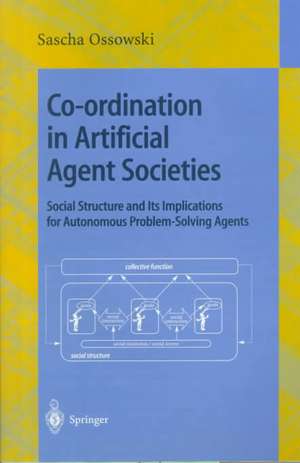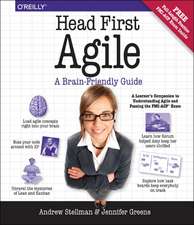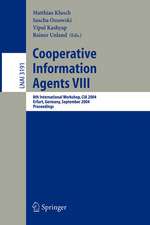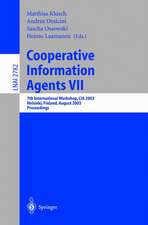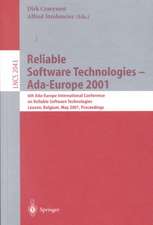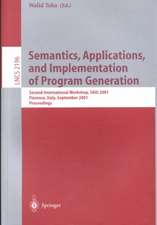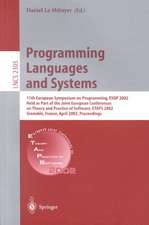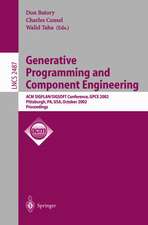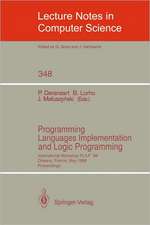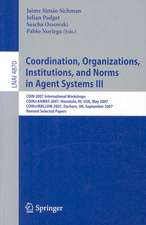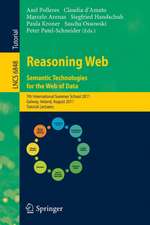Co-ordination in Artificial Agent Societies: Social Structures and Its Implications for Autonomous Problem-Solving Agents: Lecture Notes in Computer Science, cartea 1535
Autor Sascha Ossowskien Limba Engleză Paperback – 18 dec 1998
Din seria Lecture Notes in Computer Science
- 20%
 Preț: 1061.55 lei
Preț: 1061.55 lei - 20%
 Preț: 307.71 lei
Preț: 307.71 lei - 20%
 Preț: 438.69 lei
Preț: 438.69 lei - 20%
 Preț: 645.28 lei
Preț: 645.28 lei -
 Preț: 410.88 lei
Preț: 410.88 lei - 15%
 Preț: 580.46 lei
Preț: 580.46 lei - 17%
 Preț: 427.22 lei
Preț: 427.22 lei - 20%
 Preț: 596.46 lei
Preț: 596.46 lei -
 Preț: 449.57 lei
Preț: 449.57 lei - 20%
 Preț: 353.50 lei
Preț: 353.50 lei - 20%
 Preț: 1414.79 lei
Preț: 1414.79 lei - 20%
 Preț: 309.90 lei
Preț: 309.90 lei - 20%
 Preț: 583.40 lei
Preț: 583.40 lei - 20%
 Preț: 1075.26 lei
Preț: 1075.26 lei - 20%
 Preț: 310.26 lei
Preț: 310.26 lei - 20%
 Preț: 655.02 lei
Preț: 655.02 lei - 20%
 Preț: 580.93 lei
Preț: 580.93 lei - 20%
 Preț: 340.32 lei
Preț: 340.32 lei - 18%
 Preț: 938.83 lei
Preț: 938.83 lei - 20%
 Preț: 591.51 lei
Preț: 591.51 lei - 15%
 Preț: 438.59 lei
Preț: 438.59 lei - 20%
 Preț: 337.00 lei
Preț: 337.00 lei -
 Preț: 389.48 lei
Preț: 389.48 lei - 20%
 Preț: 607.39 lei
Preț: 607.39 lei - 20%
 Preț: 1024.44 lei
Preț: 1024.44 lei - 20%
 Preț: 579.30 lei
Preț: 579.30 lei - 20%
 Preț: 763.23 lei
Preț: 763.23 lei - 20%
 Preț: 453.32 lei
Preț: 453.32 lei - 20%
 Preț: 575.48 lei
Preț: 575.48 lei - 20%
 Preț: 585.88 lei
Preț: 585.88 lei - 20%
 Preț: 825.93 lei
Preț: 825.93 lei - 20%
 Preț: 763.23 lei
Preț: 763.23 lei - 17%
 Preț: 360.19 lei
Preț: 360.19 lei - 20%
 Preț: 1183.14 lei
Preț: 1183.14 lei - 20%
 Preț: 340.32 lei
Preț: 340.32 lei - 20%
 Preț: 504.57 lei
Preț: 504.57 lei - 20%
 Preț: 369.12 lei
Preț: 369.12 lei - 20%
 Preț: 583.40 lei
Preț: 583.40 lei - 20%
 Preț: 343.62 lei
Preț: 343.62 lei - 20%
 Preț: 350.21 lei
Preț: 350.21 lei - 20%
 Preț: 764.89 lei
Preț: 764.89 lei - 20%
 Preț: 583.40 lei
Preț: 583.40 lei - 20%
 Preț: 649.49 lei
Preț: 649.49 lei - 20%
 Preț: 341.95 lei
Preț: 341.95 lei - 20%
 Preț: 238.01 lei
Preț: 238.01 lei - 20%
 Preț: 538.29 lei
Preț: 538.29 lei
Preț: 329.76 lei
Preț vechi: 412.21 lei
-20% Nou
Puncte Express: 495
Preț estimativ în valută:
63.10€ • 65.88$ • 52.22£
63.10€ • 65.88$ • 52.22£
Carte tipărită la comandă
Livrare economică 05-19 aprilie
Preluare comenzi: 021 569.72.76
Specificații
ISBN-13: 9783540654957
ISBN-10: 354065495X
Pagini: 240
Ilustrații: XVI, 228 p.
Dimensiuni: 155 x 235 x 13 mm
Greutate: 0.35 kg
Ediția:1999
Editura: Springer Berlin, Heidelberg
Colecția Springer
Seriile Lecture Notes in Computer Science, Lecture Notes in Artificial Intelligence
Locul publicării:Berlin, Heidelberg, Germany
ISBN-10: 354065495X
Pagini: 240
Ilustrații: XVI, 228 p.
Dimensiuni: 155 x 235 x 13 mm
Greutate: 0.35 kg
Ediția:1999
Editura: Springer Berlin, Heidelberg
Colecția Springer
Seriile Lecture Notes in Computer Science, Lecture Notes in Artificial Intelligence
Locul publicării:Berlin, Heidelberg, Germany
Public țintă
ResearchCuprins
Co-ordination.- Distributed Artificial Intelligence.- Analysis.- Emergent Co-ordination by Structural Co-operation.- Structural Co-operation and Bargaining.- An Instrumentation of Structural Co-operation.- Road Traffic Management.- A Case Study.- Conclusions.
Textul de pe ultima copertă
This monograph provides a comprehensive survey of the different approaches to coordination in societies of artificial an human agents. Setting out from a critical assessment of the state of the art, the author develops a method of structuring multi-agent applications with a mechanism called structural cooperation. Agents are equipped with expertise about their environment in order to detect and overcome specific types of problem, they make use of their social knowledge to mutually adjust their activities, and they are coerced toward coherent collective behavior through normative rules. The proposed model is formalized theoretically within game theory and realized by means of an agent architecture. It is assessed experimentally by building a prototype of a distributed decision support system for road traffic management and compared to an alternative model based on a centralized architecture.
A valuable feature of the work is that it not only promotes a well-founded formal model of coordination in artificial agent societies but also applies it in an operational software architecture organized as a society of intelligent agents to solve real-world problems.
A valuable feature of the work is that it not only promotes a well-founded formal model of coordination in artificial agent societies but also applies it in an operational software architecture organized as a society of intelligent agents to solve real-world problems.
Caracteristici
The author presents a well-founded formal model of coordination in artificial agent societies Real-world problems solved using the model in an operational software architecture organized as a society of intelligent agents Includes supplementary material: sn.pub/extras
